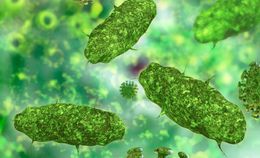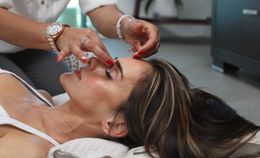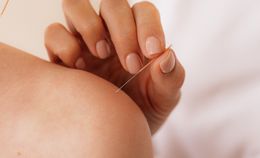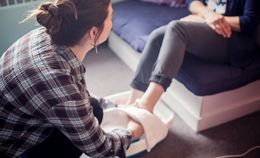There are people, male and female, out there believe that getting by on as little sleep as possible is a badge of honor or just necessary because of their busy lifestyle.
You have heard about the Gut-Brain connection, but have heard about the Sleep-Gut connection? The relationship between sleep and the microbiome is complex. The microbiota has an effect on our sleep. Our circadian rhythm appears to affect the diversity of our microbiota world that lives in our gut. So there is a by-directional effect.
Now good sleep and mood regulation are important for health and well-being. Many studies have shown that the incidence of insomnia and depressive disorder are linked to circadian rhythms, immune function, and nutrient utilization.
There is much evidence showing that the gut microbiome regulates sleep and mental states through the microbiome-gut-brain axis. As it does the same for the digestive and immune system through the same microbiome-gut-brain axis. There is also evidence indicating that microorganisms and circadian genes can interact with each other.
Recent studies have shown that circadian clock misalignment, dysfunction, sleep deprivation, and shift work experience change circadian clock gene expression and microbial community structure therefore interfering with the sleep patterns of mice has a dramatic change in the structure and diversity of the intestinal microbiota. These findings suggest that circadian genes might affect the intestinal microbiota. And also an altered microbiota affects sleep patterns.
In another study scientists put mice through a pattern of disrupted breathing that mimicked the effects of obstructive sleep apnea. It was found that the mice that lived with periods of OSA-like breathing for six weeks have significant changes to the diversity and makeup of their microbiota.
In conclusion, gut microbiome shifts could be one mechanism involved in how poor sleep and lower cognitive flexibility are linked in older adults.
There is a significant gut health connection to hormones that affect sleep. Melatonin, the "darkness hormone" has been found essential to proper sleep and a healthy sleep-wake cycle. Melatonin is actually produced in the gut as well as the brain, and there is now evidence suggesting intestinal melatonin operates on a different cyclical rhythm than the pineal melatonin generated in the brain.
Do you want to enhance your melatonin though instead of a pill?
Well, here is a list of excellent sources of naturally occurring melatonin in foods:
- Fruits and vegetables (tart cherries, corn, asparagus, tomatoes, pomegranate, olives, grapes, broccoli, cucumber)
- Grains (rice, barley, rolled oats)
- Nuts and Seeds (walnuts, peanuts, sunflower seeds, mustard seeds, flaxseed)
Here again there evidence showing that the gut and sleep relationship is a two-way street. Research has revealed that those adults who report poor sleep quality also have a less than ideal gut microbiota, as well as less cognitive flexibility. And in turn sleep disorders and disruptions are also known to negatively impact the gut microbiota.
So what's going on here? Why is there a by-directional effect?
The brain has millions of neurons that connect with the enteric nervous system (the "second brain"), which is a part of the nervous system that controls the GI tract through the Vagus nerve that runs the entire length. This is what is called the Gut-Brain axis.
There are many things about the gut-brain axis that researchers are just beginning to understand. But we do know that bacteria in the gut can produce specific neurotransmitters, such as GABA, dopamine, and serotonin. All of these are involved in the relaxation response and sleep.
So what is this Gut-Brain axis and what the benefits of keeping the Vagus nerve online, so to speak.
The vagus nerve runs for the brain to the gut (intestines, stomach) and affects heart, liver, pancreas, gallbladder, kidney, ureter, spleen, lungs, reproductive organs (female), neck (pharynx, larynx, and esophagus), ears, and tongue.
Low vagal tone has been impacted in excess Inflammation, anxiety, obesity, cognitive impairment, negative moods loneliness and heart attacks etc.
Not enough, inconsistent, or poor quality sleep are all linked to an increased risk for chronic health conditions, such as diabetes, heart disease, obesity, and depression.
So how can you support your gut health to help you sleep?
- Get more out of your food.
You are what you eat and don't excrete. Consume more high-quality and nutrient-dense foods, drinks, and supplements, in appropriate portions for you. Take a digestive enzyme supplement can support you here.
- Don't sweat the small stuff.
True, easier said than done, but less stress will impact your gut health - for the better. Know what stress does to you and the ways you can reduce it.
- Consume probiotic supplements or fermented foods.
Consistent, daily consumption of a good probiotic supplement or fermented foods like yogurt, kefir, or pickled vegetables support a balanced gut flora composition, promote brain health, and support digestion. I have found through the research that diversity is key to healthy microbiome. So rotating your Probiotic supplements is beneficial.
- Exercise every day.
Studies have consistently found that regular exercise will positively change the quality and quantity of the gut microbiota's composition, providing you with many health benefits. Exercise as shown to benefit you sleep, Short bursts of exercise in the morning is best at enhancing you sleep.
- Swap out sugars.
Research has also consistently shown that excessive sugar consumption increases the growth rate of the bad bacteria and disturbs the microbiota balance. Skip foods with added sugars; instead seek sources of carbohydrates with high fiber contents. Aim to eat 25-30 grams of fiber every day.
- Avoid excessive use of antibiotics.
Antibiotics are one of the most commonly prescribed drugs in the United States. They work by either stopping or destroying bacteria in the body - but they do it to both the good and the bad bacteria. 5
So what can I do to improve my sleep as well my Microbiome now?
Sleep tips and hacks plus a recipe:
Try to go to sleep and get up at the same time everyday even on weekends. Remember there can be exceptions, but try to avoid sleeping every weekend.
Be aware there are positives and negatives to Light exposure. Avoid bright screens an hour or two before bedtime. There are blue blockers for your PC, Cell phone, laptop and iPad. I have a blue-blocker filter in my prescription glasses. But in the morning you want to expose yourself to Sunshine within a 1 1/2 hours after Sunrise. If possible go for a 20-30 min walk in the early morning sunlight.
Exercise is an essential element to proper sleep. The best time is early morning before 9am. Vigorous activity for only 10-15 minutes. Also walking is beneficial anytime during your day. Even an evening walk is beneficial if not vigorous.
Have a 2-3 hour break between dinner and bedtime. There can be room for a nighttime snack, which can keep your blood sugar stay stable. A small amount of protein and/or carbs like cheese or unsweetened yogurt, even a small banana. Remember you have to find your combination. Enjoy some Peppermint or Sleepytime tea; it can work wonders. Going to bed even mildly dehydrated can disrupt your sleep. Dehydration causes your mouth and nasal passages to become dry, setting you up for sleep-disruptive snoring and a parched throat and hoarseness in the morning.
Supplements and Herbs that are beneficial for Sleep. Most of these I have tried.
- Ashwagandha
- Holy Basil
- Passion Flower
- Gaba and Glycine combo, but separately can also work
- Melatonin, I like drops because it is easier to start out with smaller dosage. There sublingual lozenges at 1 mg and also you can also try time release melatonin.
- Vitamin D
Here is a recipe to try:
There are many recipes for Golden milk or Moon milk out there. Here is my version:
1 cup of almond milk, coconut milk or my favorite, cashew or macadamia milk
1/2 teaspoon of Ashwagandha powder ( I use chopped from a local herb shop)1/2 teaspoon of turmeric powder
1/2 teaspoon of Ceylon cinnamon
Pinch of Himalayan salt
1/4 teaspoon of ginger fresh if possible
1/8 teaspoon cardamom
A couple shakes of nutmeg ( I buy it in a grinder, because nutmeg, once ground, loses its flavor rather quickly.)
A couple drops of liquid Stevia or Monk fruit (optional) or even Neem Honey found at Trader Joe's
References:
1 https://www.ncbi.nlm.nih.gov/pmc/articles/PMC6290721/
2 https://www.ncbi.nlm.nih.gov/pubmed/25537565
4 https://www.hindawi.com/journals/bmri/2018/2607679/
5 https://www.thorne.com/take-5-daily/article/how-your-gut-health-affects-your-sleep-quality
6 https://www.sciencedirect.com/science/article/pii/S0889159113002857
7 https://selfhacked.com/blog/32-ways-to-stimulate-your-vagus-nerve-and-all-you-need-to-know-about-it/
8 https://academic.oup.com/ajcn/article/103/3/766/4569582
9 https://www.insider.com/how-vitamin-d-affects-sleep-2019-2
10 Mayer, E. The neurobiology of stress and gastrointestinal disease. Gut 2000;47(6):861-869.
11 Ramakrishna, B. Role of the gut microbiota in human nutrition and metabolism. J Gastroenterol Hepatol 2013;28 Suppl 4:9-17.





















